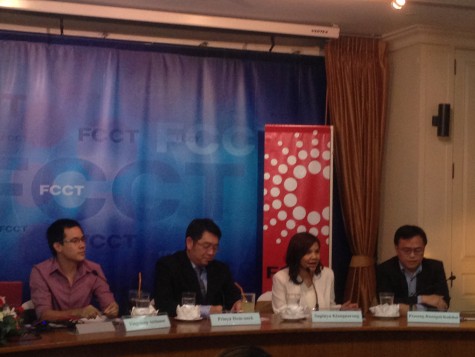Six websites of government were crashed during September 30-1October as cyber activists repetitively pressed F5 or refreshing button, as to create bottleneck. The deliberate attacking at government websites is a civil disobedience campaign against government’s proposed the single gateway policy to beef up cyber security. Government however backs down the effort on single gateway as it was lambasted by critics. Political activists looked at the junta’s censorship apparatus to monitor and intercept content in order to silence political view. Telecom experts and IT companies fear the policy will cripple the digital economy, hurt the competition and create pricier and inefficient internet service. The term “single gateway” is known as the single point of internet traffic connecting one country to the rest of the world.
Prasong Ruangsirikulchai, senior director of NTT Communications (Thailand) and executive director of Telecommunications Association of Thailand (under Royal Patronage), says it is impossible to return Thailand into single gate as the county already gave concessions to private company, and the state might not be able to provide competitive and efficient service. Over a decade ago, the country once used single gateway policy. The service operated by state CAT telecom was slow, bottlenecked and pricier. Now, Thailand has 10 active internal internet gateways out of 17 gateways.
It is no longer physically possible to cut off all service and consolidate all links into one. Critics says the policy will harm the growing telecom industry that already grow 81% during the last nine years, and is predicted to grow more given to its opening of Asean Economic Community (AEC). SIngle gateway will be operated by the state. Without competition and huge investment money and technical knowledge, state operator will not be able to increase bandwidth to meet rising data transmission. There can be problems on bottleneck, interception of private data. Prasong, the single gateway will undermine the current government’s masterplan to develop digital economy.
On contrary, Prasong proposes the government to invest more money to create submarine cables for data transmissions to make Thailand becoming digital hub in Mekong region. The submarine cable will connect India to Thailand and to Hong Kong, attracting more internet traffic from the Greater Mekong Region, serving 270 users.
The single gateway will undermine the current government’s master-plan to develop digital economy. If implemented, the country will lose its opportunity to become , digital hub for potential on-line trade within Mekong region. “Being digital economy is about more internet penetration that can invite global IT firms like Google and Facebook to conduct business here. It needs larger bandwidth and that means the need to build more submarine cables,” says Prasong.
ICT Minister Uttama Savanayana reportedly said the single gateway’s policy is misinterpreted and it is just a concept, without implement timeframe. It is not physical consolidating of internet links into one. It is rather management concept that aims to facilitate internet traffic and aggregate links, increasing bargaining power and lower internet cost.




















































































































































































































































































































































































































































































































































































































































































































































































































